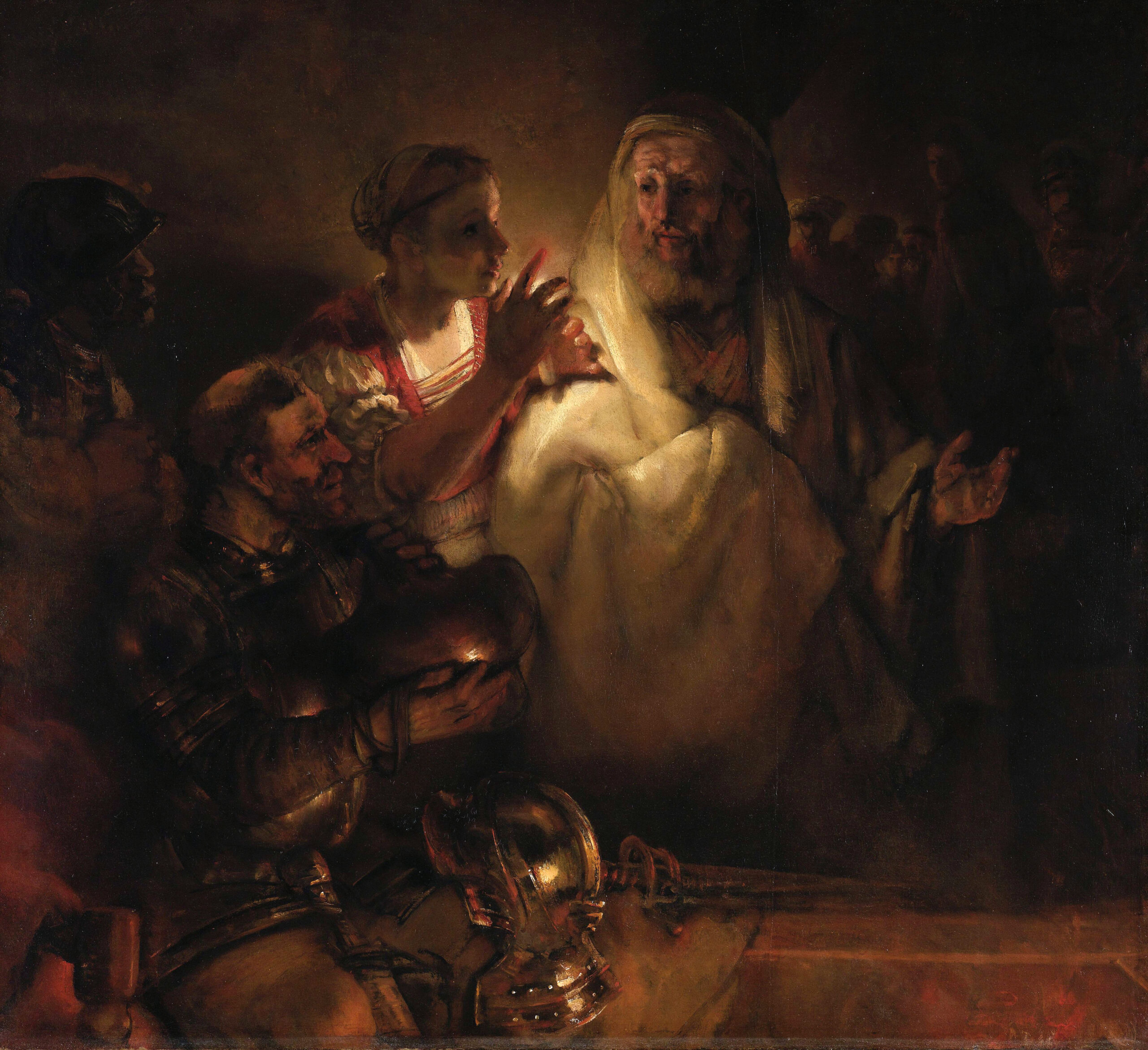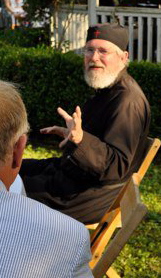
-With his left hand the disciple Peter makes a gesture of denial in response of the accusations made by Caiaphas’ maidservant, who is standing next to him holding a candle. To the left two soldiers in armor are present, one of whom is sitting at a table. To the right a chained Christ looks over his shoulder while he is being taken away. Please click on the image for greater detail.
“There’s a part of us that is wired to be careful. It senses danger and hunkers down. It looks for danger. It can easily become the dominant mode of our life. Anxiety and depression, are among the most common noises of this internal warning system. When it comes to dominate, we see the world through fear-colored glasses. In the classical language of the Church, we describe such an experience by the voices it produces: the logismoi (the “little words” or “little thoughts”).
It is of note that the logismoi rarely consist of considering information or pondering deeper things. Such things do not “nag” us. Rather it is the dark thoughts of danger, anger, sexual impulses, hunger, anxieties, etc., that haunt our minds. And so, our days have a way of drowning in petty things.
Sadly, these voices or thoughts can become the lens through which everything is filtered. The world becomes a dark and dangerous place. This same lens can turn in on the self, magnifying the sounds and symptoms of the darkness within ourselves.
A difficulty with all of this is that a warning system is not designed to serve as a world lens. It does not see beauty, it fails to see the true complexity and wonder of the world, and it darkens and obscures any knowledge of God, including our sense of His presence. The nous, the natural faculty by which we see and know God is occluded by the logismoi. We imagine that God has abandoned us, or even that He doesn’t exist.
A World of Goodness, Truth, and Beauty
A number of the early Fathers described the world with three terms: goodness, truth, beauty. It is grounded in the story of creation. When God creates, we are told that He says, “It is good.” In both Hebrew and Greek, the word translated as “good,” also carries the meaning of “beautiful” (a very interesting linguistic intuition). From this, the Fathers taught that what truly exists, that which has true being, is inherently good, and is inherently beautiful. Additionally, they taught that what is “evil,” does not have true being. Rather, it is a parasite, a distortion, and a misuse or misdirection of what is true, good, and beautiful. This parasitic distortion is the very nature of sin itself – a drive towards death and non-being. (This understanding is quite prominent in the work of St. Gregory of Nyssa and St. Dionysius the Areopagite).
But, if the truth of existence, the reality of being, is beautiful and good, what happens when the lens through which we see the world is colored by fear, lust, anger, and anxiety? We do not see what is – we see counterfeits, parasites, and dark wannabe’s. We do not see God. We do not see others. We do not even see ourselves. At least, none of these appear in the truth of their existence.
St. John offers this statement:
Beloved, let us love one another, for love is of God; and everyone who loves is born of God and knows God. He who does not love does not know God, for God is love. (1 Jn. 3:7-8)
The passage is so simple and familiar that we easily pass over it, failing to comprehend and consider what it tells us: Only love knows anything.
“He who does not love does not know God.” God is not an object, an inert entity that must stand still and endure our observations. Rather, St. John tells us, “God is love.” Only love can see Love.
The truth of creation (and of other human beings) is good and beautiful, and cannot be rightly perceived apart from love. This way of being (and perceiving) is often foreign to our actions. Instead, as fearful, anxious creatures of our logismoi, we imagine that knowledge is gained by the amassing of “facts.” The nature of such knowledge is found in its ability to manage. It represents a form of safety and comforts the mind of fear and anxiety.
Of course, such knowledge is extremely limited. The vast array of “facts” that constitutes the universe is well beyond our ken. With but the tiniest fraction of such information we spin various explanations of everything from the origins of life to the very nature of the universe itself. It is a game best played by academics, most of whom agree among themselves that the guessing game constitutes reality itself. The popular media regales the general population with daily revelations implying that we’re very close to knowing everything.
Only love knows anything.
Information Does Not Constitute Knowledge
Information does not constitute knowledge. At most, it constitutes the limits of our management. True knowledge, particularly as spoken of in the Scriptures and the Tradition of the Church, is an act of communion. Communion is an act of love.
The nous, as the organ given to us to perceive God, is an organ of love. When Christ says, “Blessed are the pure in heart for they shall see God,” He is speaking of the purified nous, a heart made whole through love. For many, even most, the nous is a reality that is largely unknown. Our pursuit of information has largely drowned even our awareness of the nous, or to pay attention and value to its voice within our experience.
In our culture, if someone spoke about coldness of the heart, we would likely describe it as an emotional issue, and dismiss it or diminish it as merely unfortunate. If, on the other hand, we were to speak about something interfering with our acquisition of information, we would treat it as a crisis of first-order. We do not understand that the greatest crisis in our lives is found in our coldness of heart. Indeed, even our acquisition of information is distorted by coldness of the heart.
Only Love Knows Anything.
In our interactions with other people, our hearing can be very selective. We can imagine that noting the words spoken is sufficient. But words are never spoken “alone” – they have an emotional context, and, quite often, other levels of meaning. St. Ignatius of Antioch once wrote: “He who possesses the word of Jesus, is truly able to hear even His very silence.” St. Ignatius is describing a context in which love is at the very center. Only love “possesses the word of Jesus.” As St. John said, “He who does not love does not know God.” Love is the beginning of true knowledge.
Of course, none of us is perfect in love. Coldness of heart can be fairly common companion, fueled by inner wounds and circumstances. I have long treasured the simple admonition: “Guard your heart.” Caught up in a world of ideas and the arguments of culture and causes, we all too easily neglect our heart. The passions cloud the nous and the coldness creeps in. We do not need an idea or information to heal us – we need communion.
The greater point of fasting, at all times, is to reacquire warmth of heart in the cleansing of our nous. It is a slowing down of mind and body and an attention to the one thing necessary. We return to our first love, for it was always love that made God known to us, however dimly.
We need to determine, above all, to guard our heart, to note the subtle hand of coldness before its grasp is complete.”
Love & truth,
Matthew

